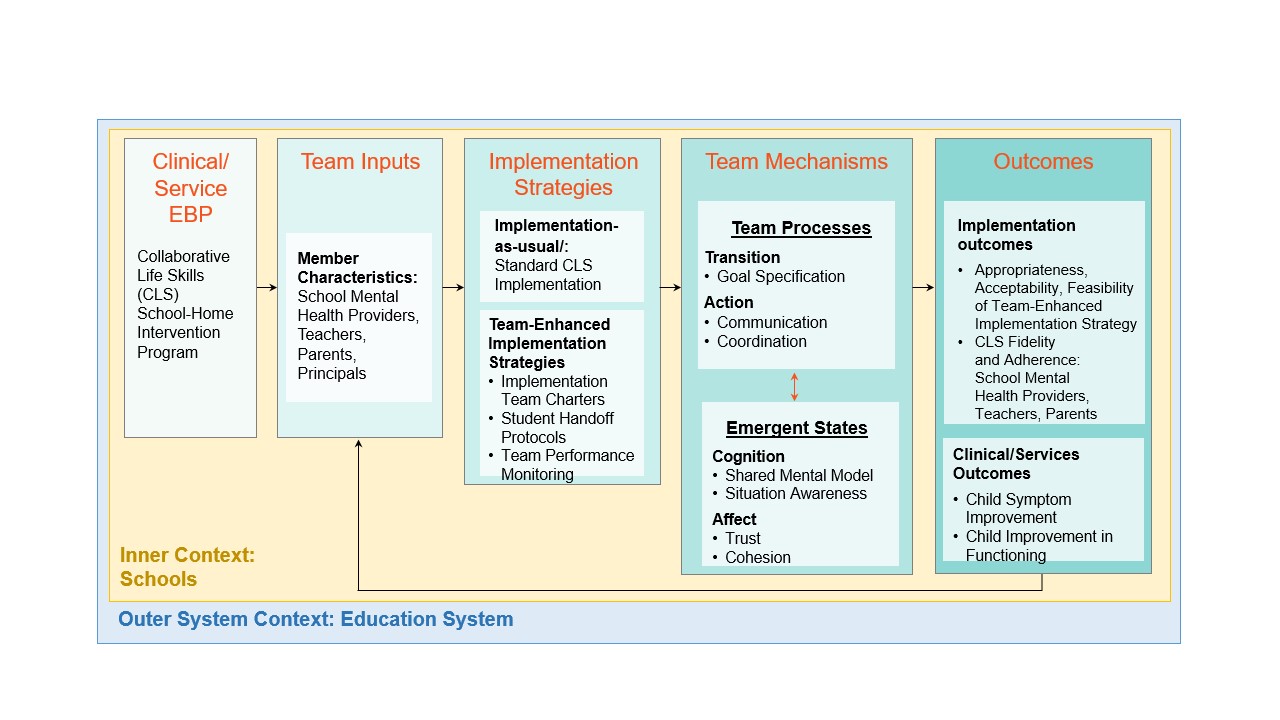R01 Enhancing Team Effectiveness for a Collaborative School-Based Intervention for ADHD
Principal Investigators: Lauren Brookman-Frazee, Ph.D. (UC San Diego), Linda Pfiffner, Ph.D. (UCSF), and Miguel Villodas, Ph.D. (San Diego State University)
Co-Investigator(s): Lauren Haack, Ph.D. (UCSF)
Project Summary
The signature R01 research project aims to integrate team-based implementation strategies to enhance implementation of the Collaborative Life Skills Program (CLS), an established school-based intervention for children with ADHD in grades 2-5. We will tailor three empirically-supported team development interventions, Team Charters, Team Communication Training (Student Handoff Protocols), and Team Performance Monitoring, and integrate them with the CLS protocol to create a team-enhanced CLS implementation protocol (CLS-T). We will conduct a Hybrid Type III cluster randomized trial in 24 schools in two large urban school districts, to evaluate whether CLS-T implementation results in improved implementation outcomes and child outcomes in comparison to standard CLS implementation.
Specific Aims
- Evaluate the effectiveness of CLS-T implementation, relative to standard CLS, on implementation outcomes.
- Evaluate the effectiveness of CLS-T implementation, relative to standard CLS implementation, on child outcomes.
- Use mixed-methods to examine if key team-based mechanisms are engaged by CLS-T implementation, relative to standard CLS implementation, and mediate its effects on implementation outcomes and child outcomes.
Team Development Interventions Used in Project
- Team Charters - Team Charters are a written document developed collaboratively by the team at the outset of their work together outlining expectations, goals, roles and responsibilities, and relevant policies and procedures for team collaborative operations. Research shows that Team Charters strengthen affective emergent states, such as trust and cohesion among team members, as well as cognitive emergent states, such as shared mental models. They also strengthen team processes, such as goal specification, communication, and coordination to optimize team effectiveness.
- Handoff Protocols - Handoff protocols are widely used interventions for ensuring continuity in patient care and minimizing errors in medical settings. They have also been found to improve affective (e.g., trust, cohesion) and cognitive (e.g., shared mental models, situation awareness) emergent states among team members, enhancing team communication and coordination.
- Team Performance Monitoring - Team Performance Monitoring provides feedback to teams that can motivate performance, provide opportunities for adaptation in the event of challenges, and prompt communication among team members.
Conceptual Model 
Funding Information: P50MH126231
Study time period: 08/05/2022 - 05/31/2027
NIH RePORTER

